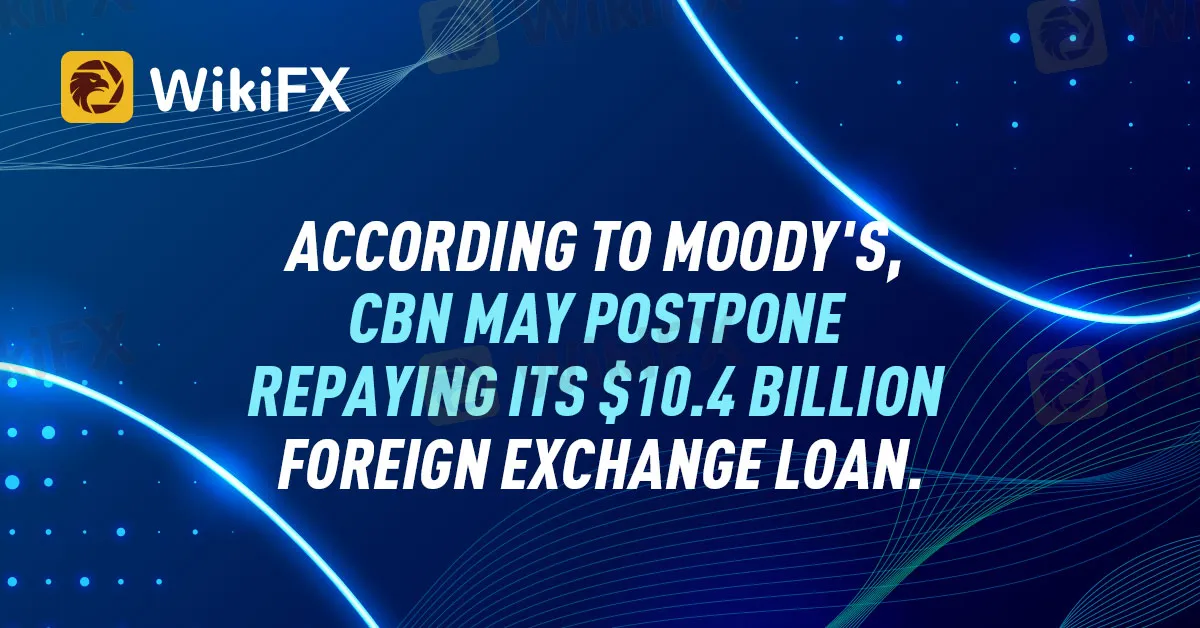简体中文
繁體中文
English
Pусский
日本語
ภาษาไทย
Tiếng Việt
Bahasa Indonesia
Español
हिन्दी
Filippiiniläinen
Français
Deutsch
Português
Türkçe
한국어
العربية
ACCORDING TO MOODY'S, CBN MAY POSTPONE REPAYING ITS $10.4 BILLION FOREIGN EXCHANGE LOAN.
Abstract:The CBN owes the banks money in the form of derivative transactions, which include swaps and forward contracts. In a loan, a certain quantity of money is given to another person in exchange for the value or main amount being repaid at a later date. In many circumstances, the lender increases by adding interest or finance charges, which the borrower must pay in addition to the original money collected.

The Central Bank of Nigeria's repayment of a total $10.4 billion in bank loans in foreign currency may take longer than anticipated.
The changes experience a dollar shortage that endangers lenders' liquidity and may eventually cause their capital to weaken.
If Nigeria decides to fully honor its dollar obligations and the payments would deplete over one-third of the continent's largest economy's foreign reserves and which as of February 14 totaled $36.8 billion.
According to Timchang Gwatau, at GCR Ratings, a Moody's affiliate, “the problem the report is addressing here is that there is a lot of foreign currency pressure here and there, and all that.”
The likelihood that it will occur is quite low, but if it does, banks' FX liquidity positions will undoubtedly be put under a lot of stress.
According to Moody's analysts Lynn Merhi and Mik Kabeya, the CBN owes the banks money in the form of derivative transactions that include forward contracts and swaps. Although the central bank has a record of paying back the FX it owes to the banks, there is a higher risk that it will extend some contracts and delay repayment now that there are severe foreign exchange shortages, according to a report from Moody's.
According to the rating agency, if the companies they provide with FX through trade finance go out of business, this might put pressure on lenders and make the liquidity problem worse.
For purposes relating to trade financing, Nigerian banks granted $9.8 billion in loans last year, making up more than half of the banks' liquid foreign exchange assets.
According to Moody's, “a major delay in repayment might put the banks in a position where they run out of their own foreign currency and limit their capacity to repay their own foreign currency commitments.”
Lenders provide trade finance services to businesses so they can import goods or conduct overseas business.
They must go through a process whereby they must apply to the CBN for foreign cash, which frequently takes some time and as a result, they frequently seek banks to satisfy their needs while they wait for the apex bank to issue the funds. The CBN transfers the funds to the banks so as to settle the exposure after providing them. At the end of the day, the banks will bear the brunt of it, according to Mr. Gwatau, since on the one hand, you made a pledge to a foreign counter party that if he doesn't deliver you your money by a certain date, I would give it to you.
Therefore, the bank will have to intervene if an import company defaults on its obligation. The bank is under pressure if the CBN also defaults or if it fails to provide the banks with their requested foreign exchange. The recipient is the bank in the end.

Disclaimer:
The views in this article only represent the author's personal views, and do not constitute investment advice on this platform. This platform does not guarantee the accuracy, completeness and timeliness of the information in the article, and will not be liable for any loss caused by the use of or reliance on the information in the article.
Read more

The Ultimate Guide to Automated Forex Trading in 2025
Modern markets are revolutionized by automated trading systems, which now execute 70-85% of all transactions. These advanced automated trading software solutions, commonly called trading robots or Expert Advisors (EAs), leverage algorithmic precision for automatic trading across forex, stocks, and commodities 24/7. By removing emotional interference and executing trades in microseconds, auto forex trading platforms create fair opportunities for all market participants. For those new to automated trading for beginners, these systems provide disciplined, backtested strategies while significantly reducing manual effort.

Philippines Deports 29 Indonesians Linked to Online Scam Syndicate in Manila
Online scam groups in the Philippines trick Filipinos into gambling and love scams, from Manila to Bacolod, causing trafficking and pain as police fight back.

Why does your mood hinder you from getting the maximum return from an investment?
Investment decisions are rarely made in a vacuum. Aside from the objective data and market trends, our emotions—and our overall mood—play a crucial role in shaping our financial outcomes. Whether you’re feeling overconfident after a win or anxious after a loss, these emotional states can skew your decision-making process, ultimately affecting your investment returns.

How Reliable Are AI Forex Trading Signals From Regulated Brokers?
Discover how reliable AI Forex trading signals are and why using a regulated broker boosts their effectiveness. Learn key factors to evaluate accuracy and enhance your trading.
WikiFX Broker
Latest News
How Crypto Trading Transforms FX and CFD Brokerage Industry
UK would not hesitate to retaliate against US tariffs - No 10 sources
FCA Warns Against 10 Unlicensed or Clone Firms
CySEC Warns Against 14 Unlicensed Investment Websites
Top Currency Pairs to Watch for Profit This Week - March 31, 2025
Will natural disasters have an impact on the forex market?
Philippines Deports 29 Indonesians Linked to Online Scam Syndicate in Manila
Navigating the Intersection of Forex Markets, AI Technology, and Fintech
Exposed: Deceptive World of Fake Trading Gurus – Don’t Get Fooled!
AI-Powered Strategies to Improve Profits in Forex Trading
Currency Calculator







